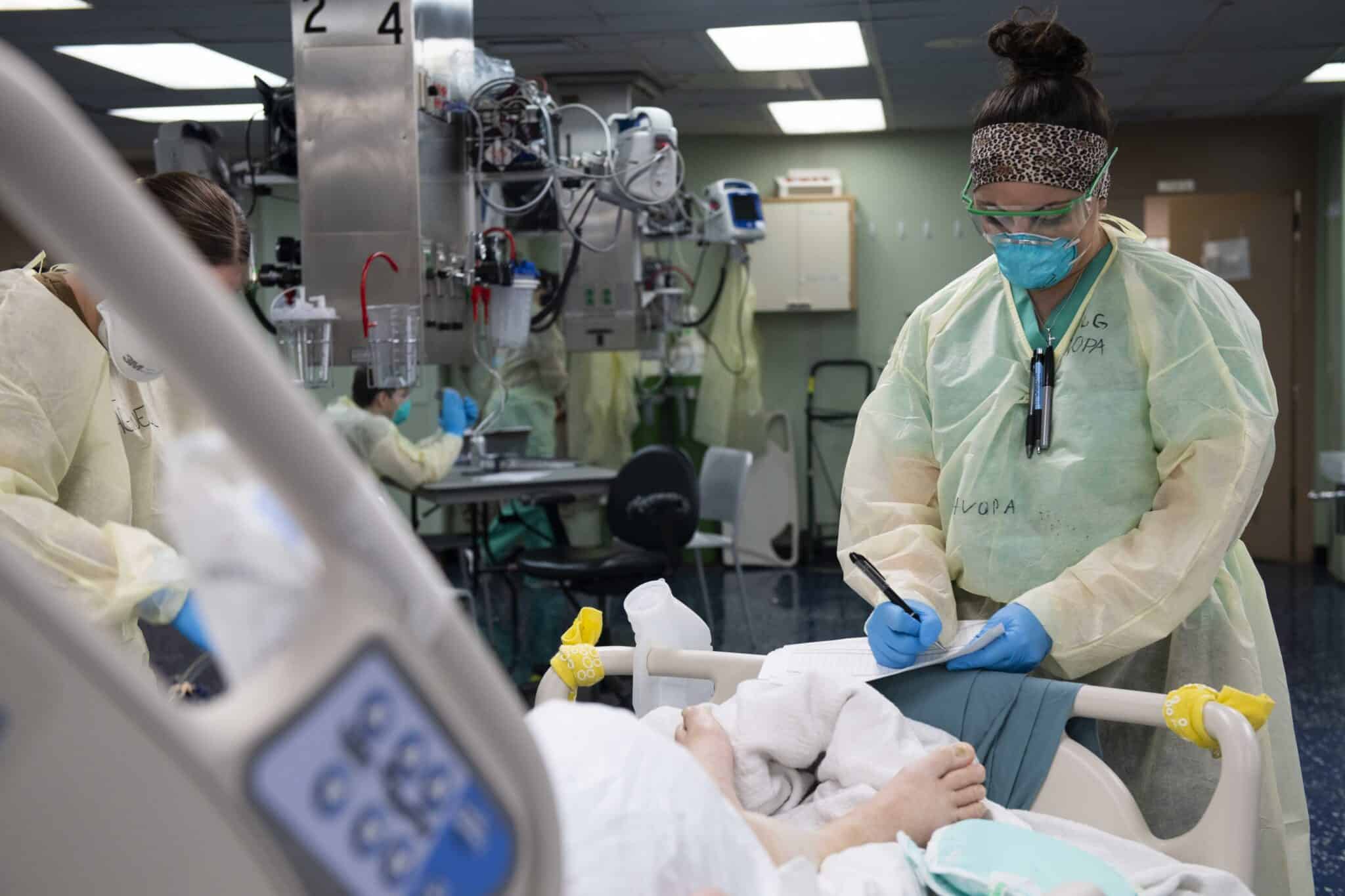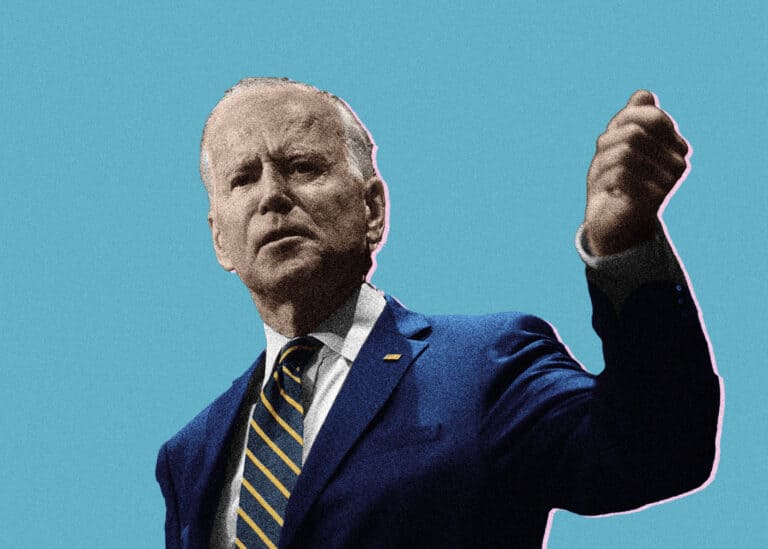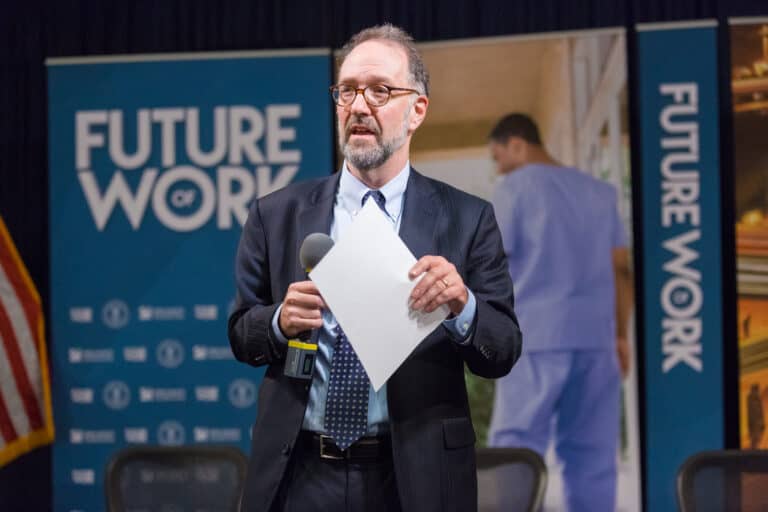Jenny Samuels is a student at Harvard Law School and a member of the Labor and Employment Lab.
Last month, the Biden Administration signaled that it’s going back to the drawing board on the Trump Administration’s “conscience” rule, which sought to give healthcare workers a nearly unfettered ability to refuse to take part in any activity they believed impinged on their religious or moral beliefs. Now that it has the opportunity, the Biden Administration should rescind the rule and promulgate a new policy that will give employers latitude to protect patients’ health, lives, and access to care.
The 2019 Conscience Rule
The Department of Health and Human Services (HHS) promulgated the conscience rule in 2019. The rule claimed to be in response to what HHS deemed a pervasive issue of “discrimination and coercion” by employers against healthcare workers with religious or moral objections to various activities, namely those related to the provision of reproductive healthcare and services for LGBTQ+ individuals.
To combat that issue, the rule made it easier for employees involved in every aspect of healthcare — from doctors and nurses to receptionists, custodial staff, and ambulance drivers — to exercise a right of refusal. Religious employees already receive extensive protections against discrimination, such as through Title VII’s prohibition on employment discrimination. But unlike Title VII, the Trump Administration’s rule gave employers almost no latitude to object to, or mitigate the harms of, a religious refusal. For example, the 2019 rule’s definition of “discrimination” did not incorporate Title VII’s undue hardship defense or a reasonable accommodation standard for employers — meaning that virtually the only acceptable accommodation an employer could offer is one the employee actually accepts. An employer that could not afford to accommodate a religious objection, or that offered an accommodation that the employee rejected, could face a revocation of federal funds.
In its rulemaking, the agency responded to numerous comments voicing concerns that the conscience rule could harm pregnant people, LGBTQ+ individuals, people living with HIV/AIDS, and people of color, among other vulnerable groups. HHS did not deny that such harms were possible, but it said that any costs of religious refusals would be “outweighed by . . . overall access to care due to the removal of barriers for providers, or the benefits of compliance with the law and respect for conscience and religious freedom.” Nor did HHS rule out that a conscience objection could be invoked in emergency situations, such as by an ambulance driver bringing a person with pregnancy complications to the hospital. Whether or not such an objection would be protected by the rule, HHS stated, “would depend on the facts and circumstances.”
The rule faced challenges in federal courts in New York, Washington, and California. In all three cases, the courts found that the Trump Administration’s rule violated the Administrative Procedure Act’s substantive and procedural requirements for rulemaking, and all agreed that the entire rule should be invalidated. The Trump Administration appealed these decisions in the Ninth and Second Circuits, but in the meantime President Biden was elected. The new administration moved to cancel oral arguments, stating that “[n]ew leadership at HHS is currently in the process of arriving at the agency and plans to reassess the issues that these cases present.”
The Future of Religious & Moral Objections for Healthcare Workers
As it reconsiders the Trump conscience rule, the Biden administration should acknowledge the great harms that such an unfettered right of refusal could impose on patients. While employers should make reasonable efforts to accommodate the religious beliefs of employees, as is required under Title VII, accommodations and exemptions should not come at the expense of patient wellbeing.
A case from two decades ago, Shelton v. University of Medicine & Dentistry, is illustrative of the dangers presented by a broad religious exemption policy. Shelton was a nurse in the labor and delivery section of a hospital who had a religious objection to abortion. While the hospital did not offer elective abortions, on two occasions Shelton refused to assist a pregnant patient facing life-threatening conditions because she believed that the requisite treatment would terminate the patient’s pregnancy. In one case, a patient was “standing in a pool of blood” when Shelton refused to participate in treatment, causing a thirty minute delay in the patient’s care. Shelton rejected an accommodation offered by the hospital to move her to a different ward and was subsequently fired.
Shelton sued the hospital for employment discrimination under Title VII but lost her case because the court found that the hospital had offered her a reasonable accommodation. Under the Trump rule, however, the outcome likely would have been reversed — a fact that was acknowledged by HHS at oral arguments.
Shelton’s case is just one example of the dangers that could result from a broad right of religious refusal in the healthcare context. The 2019 rule would also allow a hospital custodian to refuse to clean the room of a transgender patient recovering from surgery, or allow a receptionist to refuse to schedule an appointment for a patient seeking contraceptives. Faced with a potential discrimination lawsuit and the revocation of federal funds, an employer might feel obligated to simply allow such exemptions to occur, even in the knowledge that patient care could be compromised as a result.
While in some situations it might be possible for an employer to mitigate the harms of a religious refusal, this is not always feasible. For example, a rural hospital or an underfunded clinic might have a limited staff or otherwise lack the resources to ensure patients can still receive needed care despite an employee’s objection. Even the most well-resourced healthcare provider cannot always predict when the basis for a religious objection might occur — when an ambulance is sent to pick up a patient, for example, it might not be apparent what the patient’s medical needs are until arrival. Furthermore, even if they are ultimately able to access needed care, a patient may experience dignitary and psychological harm simply from the refusal itself.
The Biden Administration will no doubt face immense pressure to keep some version of the Trump conscience rule in place. Armed with the support of an extremely conservative Supreme Court, advocates for religious exemptions will likely argue that an unfettered right of religious refusal is not only desirable, but actually required under law. But such a policy is not required, and in fact directly contravenes the longstanding assumption underlying much of religious freedom jurisprudence that religious exemptions should not cause harm to third parties. The third-party harm principle has animated Supreme Court decisions regarding religious refusals until recently, even as the Court has grown increasingly conservative. While the Court has edged closer to abandoning the harm principle in some religious exemption cases, including in situations where people’s lives could be put at risk, it has certainly never upheld an exemption regime that so directly endangers patients seeking medical care.
The Biden Administration should seriously consider the harms that will inevitably result from religious refusals in the healthcare context. At the very least, any future policy should not put employers in the position of prioritizing employees’ religious or moral beliefs over patient wellbeing. As Justice Ginsburg liked to say, when it comes to religious freedom, “[y]our right to swing your arms ends just where the other man’s nose begins.”










Daily News & Commentary
Start your day with our roundup of the latest labor developments. See all
February 27
The Ninth Circuit allows Trump to dismantle certain government unions based on national security concerns; and the DOL set to focus enforcement on firms with “outsized market power.”
February 26
Workplace AI regulations proposed in Michigan; en banc D.C. Circuit hears oral argument in CFPB case; white police officers sue Philadelphia over DEI policy.
February 25
OSHA workplace inspections significantly drop in 2025; the Court denies a petition for certiorari to review a Minnesota law banning mandatory anti-union meetings at work; and the Court declines two petitions to determine whether Air Force service members should receive backpay as a result of religious challenges to the now-revoked COVID-19 vaccine mandate.
February 24
In today’s news and commentary, the NLRB uses the Obama-era Browning-Ferris standard, a fired National Park ranger sues the Department of Interior and the National Park Service, the NLRB closes out Amazon’s labor dispute on Staten Island, and OIRA signals changes to the Biden-era independent contractor rule. The NLRB ruled that Browning-Ferris Industries jointly employed […]
February 23
In today’s news and commentary, the Trump administration proposes a rule limiting employment authorization for asylum seekers and Matt Bruenig introduces a new LLM tool analyzing employer rules under Stericycle. Law360 reports that the Trump administration proposed a rule on Friday that would change the employment authorization process for asylum seekers. Under the proposed rule, […]
February 22
A petition for certiorari in Bivens v. Zep, New York nurses end their historic six-week-strike, and Professor Block argues for just cause protections in New York City.